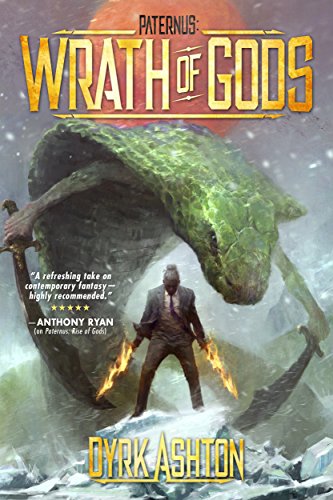
![]() Paternus: Wrath of Gods by Dyrk Ashton
Paternus: Wrath of Gods by Dyrk Ashton
Paternus: Wrath of Gods (2018) is the second book in Dyrk Ashton’s PATERNUS series, following Paternus: Rise of Gods. In that book Fiona Patterson and her would-be boyfriend Zeke were wrenched out of their fairly ordinary Ohio teenager lives and thrust into a war of gods — small “g” gods, actually the offspring of the Paternus of the title, whose past deeds form the basis of most human mythology. (It’s not a major plot point — at least, not yet — but at least two of these “gods” are perfectly sincere Christians. I’m not quite sure where Mr. Ashton is going with that, but I do hope to find out.)
The war among these “gods” intensifies in this book; Fiona and Zeke learn more about and develop their own unusual gifts, numerous gods thought dead have been returned to some kind of life by foul necromancy to fight for the forces of evil, and the plague of locusts which had begun at the end of the last book is spreading throughout the known worlds — although, curiously, it has not reached our own. A number of the “gods” who have fallen in with Fiona, Zeke, and the Paternus, and who appear to be struggling for the survival of the human race have dubious motives, and at least one of them is an outright traitor waiting for the right moment to strike. We are, once again (perhaps too often) introduced to a series of new “gods,” both as supporters and as adversaries, and in the end we learn who is really controlling the struggle against our heroes — the Paternus and his followers — and why this struggle promises to be even more cataclysmic than the first two wars of the gods.
Overall I found Paternus: Wrath of Gods a good yarn and worth a read, but slightly disappointing compared to the first in the series. On the positive side, it is certainly action-packed, it has a couple of good plot twists, many of the characters are engaging, and it’s fun to learn of a number of mythological figures I had never heard of before. On the not-so-positive side, I felt like the story has too many characters — which is somewhat exacerbated by their being introduced in more or less the same way — to really pay attention to or care about, and the pacing is rather frenetic. I really enjoyed a tender scene between Fiona and her Uncle Edgar near the end of the book exactly because it was a slower and more character-driven moment, and I think the story would have been better for more variation in pace and emphasis, so as to heighten the action by contrast.
In addition, this book suffered a bit on the editing front. Having now seen my wife publish through Amazon, I have an increased appreciation for the fact that editing self-published books is very much an iterative project, and the rough spots are more evident in Paternus: Wrath of Gods than in its predecessor. For example, we are at one point informed that something is “inexplicable” and that it “can’t be explained” in the same sentence. Similar problems surface quite a bit more often here than in the first book of the series. I do expect that many of these infelicities will be removed sooner rather than later.
~Nathan Okerlund
![]() I’m in agreement with Nathan on Paternus: Wrath of Gods. About the first novel, I said it was very well written, “a wild ride,” and that “it’s too ambitious as far as the number of religions, legends, and myths Ashton managed to pack into one novel… it felt a bit cluttered.” I feel the same way about its sequel.
I’m in agreement with Nathan on Paternus: Wrath of Gods. About the first novel, I said it was very well written, “a wild ride,” and that “it’s too ambitious as far as the number of religions, legends, and myths Ashton managed to pack into one novel… it felt a bit cluttered.” I feel the same way about its sequel.
The story is exciting and I like the characters, but it’s non-stop high-intensity action with so many new mythological or legendary characters being introduced (along with a bit of information about them) that I started to lose track and feel overwhelmed. I learned a lot, but probably didn’t retain most of it.
More focus on fewer characters would help, but I do appreciate what Ashton is trying to do here – sort of like a “Theory of Everything” for myths, legends, and religion.
The audio version read by Nik Magill is very nicely done.
~Kat Hooper




How did I miss this? Thanks for bringing it to my attention!
I guess that is true, Marion. And when it comes to "You Only Live Twice," I saw the movie TWICE…
I absolutely loved this deep dive into Edwige Fenech's giallo films! Her unique blend of allure and mystery truly captivates.…
You managed to work in your two loves; vintage fiction and films!
Yup, Marion, your memory serves you well! Oh...as regards these three recent Bond reviews of mine, as the old saying…